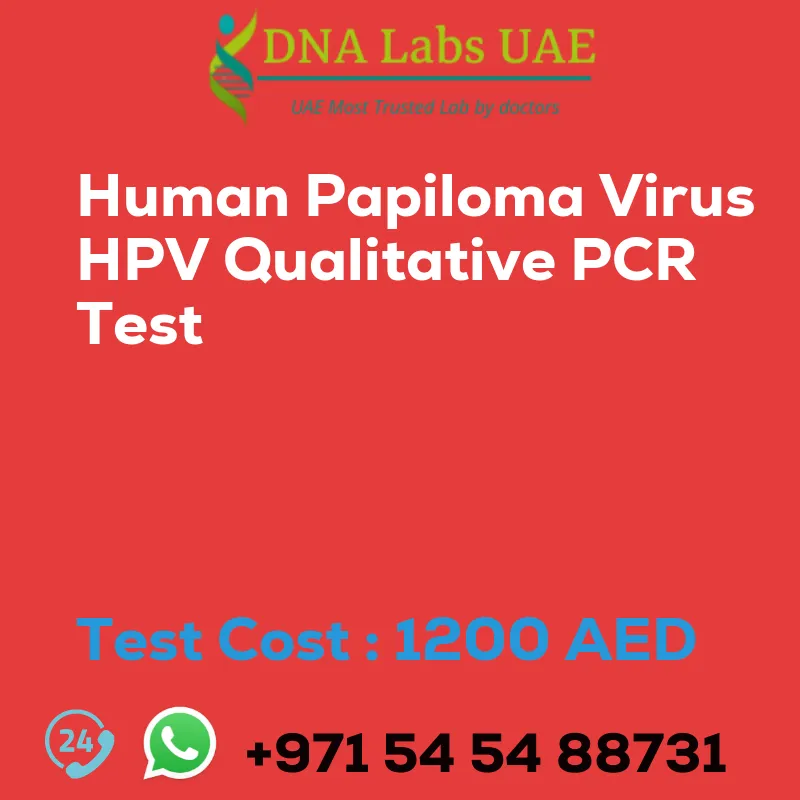Human Papiloma Virus HPV Qualitative PCR Test
Test Name: Human Papiloma Virus HPV Qualitative PCR Test
Components: Sterile container
Price: 1200.0 AED
Sample Condition: Cervical swab, FFPE Tissue blocks
Report Delivery: 2-3 days
Method: Real Time PCR
Test type: Genetics
Doctor: General Physician
Test Department:
Pre Test Information: Human Papiloma Virus (HPV) Qualitative PCR can be done with a Doctors prescription. Prescription is not applicable for surgery and pregnancy cases or people planning to travel abroad.
Test Details:
Human Papillomavirus (HPV) qualitative PCR is a laboratory test used to detect the presence of HPV DNA in a patient’s sample. HPV is a common sexually transmitted infection that can cause genital warts and various types of cancer, including cervical, anal, and throat cancer. The PCR (polymerase chain reaction) technique amplifies the HPV DNA in the sample, making it easier to detect. The qualitative aspect of the test means that it determines whether the HPV DNA is present or not, rather than quantifying the amount of virus present.
The HPV qualitative PCR test is typically performed on samples collected from the cervix, anus, throat, or genital warts. The sample can be collected through a swab or biopsy. The DNA from the sample is then extracted and amplified using PCR. The test is highly sensitive and specific, allowing for the detection of various types of HPV. It can identify high-risk HPV types that are associated with an increased risk of cancer, as well as low-risk types that cause genital warts.
The results of the HPV qualitative PCR test are usually reported as positive or negative for the presence of HPV DNA. If the test is positive, further testing may be done to determine the specific HPV type present. This test is commonly used in screening programs for cervical cancer, as HPV infection is a major risk factor for the development of this cancer. It can also be used to diagnose genital warts or assess the risk of other HPV-related cancers.
It is important to note that the HPV qualitative PCR test detects the presence of HPV DNA, but it does not indicate whether the infection is active or if it will lead to disease. Further clinical evaluation and follow-up may be necessary to determine the significance of the HPV infection and its potential health implications.
| Test Name | Human Papiloma Virus HPV Qualitative PCR Test |
|---|---|
| Components | Sterile container |
| Price | 1200.0 AED |
| Sample Condition | Cervical swab, FFPE Tissue blocks |
| Report Delivery | 2-3 days |
| Method | Real Time PCR |
| Test type | Genetics |
| Doctor | General Physician |
| Test Department: | |
| Pre Test Information | Human Papiloma Virus (HPV) Qualitative PCR can be done with a Doctors prescription. Prescription is not applicable for surgery and pregnancy cases or people planing to travel abroad. |
| Test Details |
Human Papillomavirus (HPV) qualitative PCR is a laboratory test used to detect the presence of HPV DNA in a patient’s sample. HPV is a common sexually transmitted infection that can cause genital warts and various types of cancer, including cervical, anal, and throat cancer. The PCR (polymerase chain reaction) technique amplifies the HPV DNA in the sample, making it easier to detect. The qualitative aspect of the test means that it determines whether the HPV DNA is present or not, rather than quantifying the amount of virus present. The HPV qualitative PCR test is typically performed on samples collected from the cervix, anus, throat, or genital warts. The sample can be collected through a swab or biopsy. The DNA from the sample is then extracted and amplified using PCR. The test is highly sensitive and specific, allowing for the detection of various types of HPV. It can identify high-risk HPV types that are associated with an increased risk of cancer, as well as low-risk types that cause genital warts. The results of the HPV qualitative PCR test are usually reported as positive or negative for the presence of HPV DNA. If the test is positive, further testing may be done to determine the specific HPV type present. This test is commonly used in screening programs for cervical cancer, as HPV infection is a major risk factor for the development of this cancer. It can also be used to diagnose genital warts or assess the risk of other HPV-related cancers. It is important to note that the HPV qualitative PCR test detects the presence of HPV DNA, but it does not indicate whether the infection is active or if it will lead to disease. Further clinical evaluation and follow-up may be necessary to determine the significance of the HPV infection and its potential health implications. |








